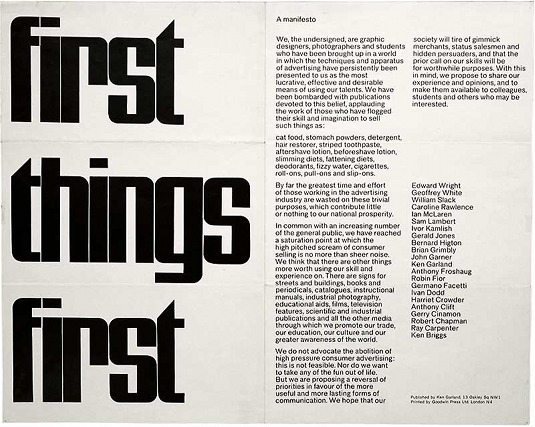Cole Peters on updating the First Things First Manifesto
Are your skills being put to use on worthwhile projects that solve real problems? Cole Peters thinks we need to get our priorities straight.
Sign up to Creative Bloq's daily newsletter, which brings you the latest news and inspiration from the worlds of art, design and technology.
You are now subscribed
Your newsletter sign-up was successful
Want to add more newsletters?
In 1964 a group of designers signed a manifesto pledging to use their skills for more worthwhile purposes than the consumer advertising work that seemed to be taking up much of their time and effort.
50 years later designer Cole Peters set out to write a new manifesto that includes web workers and addresses the new ways in which those with skills in the fields of design and technology are spending too much time working on superficial problems. The new manifesto states that the industry prioritises profit over usefulness and isn't particularly focused on solving real problems around education, medicine, privacy, public awareness and other important areas. It proposes a re-ordering of our priorities to create an industry that produces more meaningful work. You can sign it here.
We quizzed Cole to find out what drove him to undertake this project.
What's your background?
I'm a designer, writer and occasional noise/music artist, born and raised in Canada but now living in London, England.
What gave you the idea to do this?
A growing discontent with certain aspects of the design and technology industries over the past couple years, especially in light of the Snowden revelations but also with regards to the lack of diversity within the community. The previous editions of First Things First have been important in shaping my approach the work I choose to put into the world, but I also saw room to add and refocus the manifesto in light of the world we find ourselves in today.
Why is now such an important time for design?
I don't know if "now" is as important a time for design as it is for culture and societies in general. But because technology (and therefore communications, and therefore design) forms such a prominent part of our culture, I think it's critical for designers, developers, communicators and technologists (all of whom the manifesto addresses) to take a good look at the situation we're in. It's not entirely pretty, and there's a lot of work that can - and, I think, should - be done for the betterment of everyone.
For example, there's been a lot of talk and prospects lately around the 'redecentralisation' of the web, including projects like MailPile, Indie Phone, Hemlis, etc. Working to give control and ownership of personal data back to the people is an important initiative that designers need to have key input on (while the three projects I mentioned all have strong design leads, there are a great many open source projects that badly need the presence of skilled designers). Combatting the damage done by the NSA, GCHQ are other invasive government bodies should be a big priority for those possessing even a modest concern about the future of the web and technology.
Sign up to Creative Bloq's daily newsletter, which brings you the latest news and inspiration from the worlds of art, design and technology.
Other areas that can benefit from the work of designers, developers, content strategists etc., include the medical industry (especially where communicating with patients is a priority, as many systems are not patient-friendly right now), investigative journalism (more needed than ever before), and education systems (which are frequently some of the slowest-to-adapt entities out there - just look at design schools).
None of this should be taken as me (or the manifesto) suggesting that commercial work should be totally off the books; we all need to pay the bills and not all commercial work is bad. But it should be balanced with a concern for ethical, human-centric endeavours, and right now, there's a lot of room for more of this to happen to say the least.
Lastly, there are inter-industry problems (primarily centred around a severe lack of diversity in gender, race, and age, and horrific work-life (im)balances) that we all need to start fixing. If we as professionals claim to work in the service of the human race (and not just the young, rich, or white), our industry should start to encompass a more diverse, healthy spectrum of individuals.

It looks like this project has grown into something bigger than perhaps you imagined when you started out. Is that fair to say?
Absolutely. I expected some marginal interest, but the level of support and attention has been a wonderful surprise. I can only hope it leads to some productive conversations and actions in the community.
What kind of response have you had from the community?
The response has been mostly positive, and always interesting. A bunch of people have taken time out of their day to write me some lengthy, considered emails on their thoughts on the project, offering to help out and just generally being amazingly supportive. I've also had some great interest from and discussions with writers and publications. Even the limited negative or critical feedback so far has been interesting to read and discuss.
How have people been critical?
At this point the critical feedback has been very minimal. Some people have suggested that the words of the manifesto may not end up translating into actions; others have posited that the manifesto is better at suggesting what *not* to do, as opposed to informing readers of where to go next. Both are valid concerns, but in the end the role of the manifesto is to encourage dialogue about the issues at hand - it's up to the people who support it to turn that dialogue into actions in their own way, and the more people the manifesto and dialogue reaches, the better the chances of us seeing more of those actions.
What technical challenges have you experienced?
The only technical challenge so far has been implementing a solid process to allow viewers to sign the manifesto online. Thankfully a developer named Steven Langbroek has been lending a much-needed hand with this, freeing me up to panic about everything else!
You can read more about the work behind this project on Cole's blog.
Words: Tanya Combrinck

The Creative Bloq team is made up of a group of art and design enthusiasts, and has changed and evolved since Creative Bloq began back in 2012. The current website team consists of eight full-time members of staff: Editor Georgia Coggan, Deputy Editor Rosie Hilder, Ecommerce Editor Beren Neale, Senior News Editor Daniel Piper, Editor, Digital Art and 3D Ian Dean, Tech Reviews Editor Erlingur Einarsson, Ecommerce Writer Beth Nicholls and Staff Writer Natalie Fear, as well as a roster of freelancers from around the world. The ImagineFX magazine team also pitch in, ensuring that content from leading digital art publication ImagineFX is represented on Creative Bloq.
